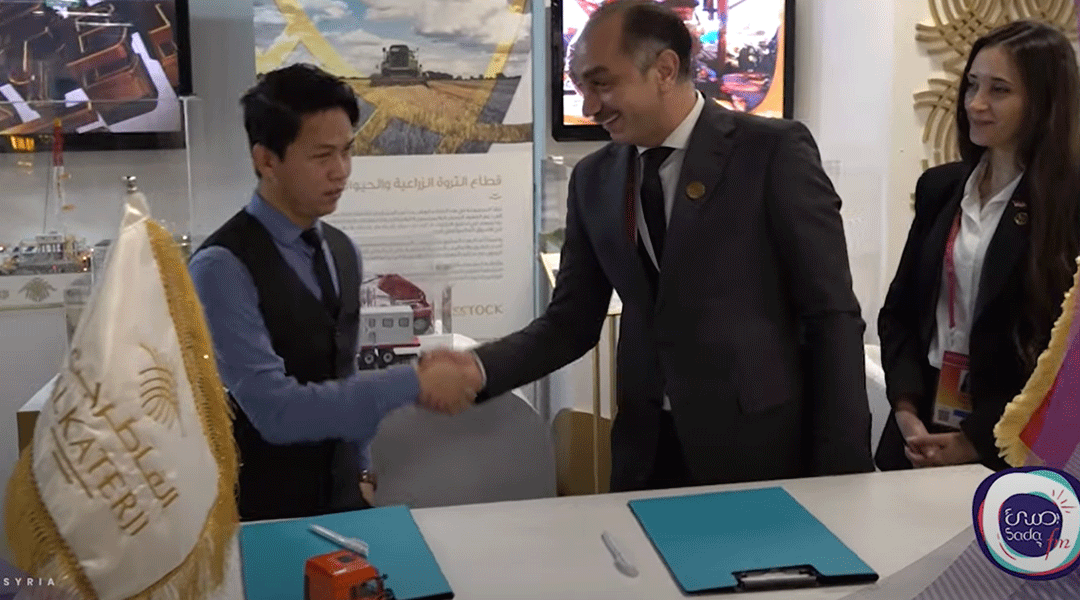On Saturday, Katerji Holding Group announced signing a contract with a Chinese company to build Syria’s “largest plant” to manufacture and assemble heavy machinery.
The announcement was made in a video statement by pro-regime media personality Shadi Hilweh, the director of Sada FM Syria radio. The station is funded by Hossam Katerji, one of the Assad regime’s most prominent businessmen who has emerged in recent years.
The statement claimed that, at Syria’s pavilion at Expo Dubai, Katerji Holding Group had signed a contract to build “the largest plant in Syria and in the Middle East to manufacture and develop heavy machinery (trucks, pullmans, public transport buses, vans, and microbuses).”
“The executed contract is important for Syria because it is the first and largest such contract in Syria and the region,” said the group’s representative in the recording. The representative added that the Katerji Group had signed the contract with the largest companies in China.
“Syria has a strategic position in the Middle East. It serves as a link between Lebanon, Jordan, and Iraq,” said an unnamed representative of the Chinese company, adding: “Syria offers many advantages, the most important of which is the recently passed investment law.”
The Katerji Group did not disclose the name of the Chinese company, and whether it is one of the largest companies in China or not.
Two weeks ago, the Assad government signed a memorandum of understanding with China as part of both the Silk Road Economic Belt and the 21st Century Maritime Silk Road Initiative.
Read Also: Syria, China Sign Silk Road Economic Belt Initiative MoU
The memorandum provides for “the exchange of goods, technology, and capital, as well as the revitalization of the freedom of movement.” The memorandum also provides for cultural exchange.
China is one of the most prominent countries that has maintained relations with the Assad regime, supporting it politically and economically since the Syrian revolution began in 2011.
Commenting on the contract between Katerji and the Chinese company, economist Younis al-Karim said: “The issue is only part of fraudulent projects, for technical, political and economic reasons.”
“The issue falls under several frameworks. First, it aims to attract China and reflect that China wants to invest in Syria. This has implications for Russia, which has begun to resent its role as the regime’s internal incubator, for not helping the Syrian people and improving the economic situation,” Karim told Al-Souria Net on Sunday.
“The second point is to try to reassure the Syrian people and say that the coming days are better. Third, the announcement wants to shift focus towards the fact that the regime’s return to the international community is strongly supported by China.”
Karim said that China cannot complete such a project due to “the collapse of Syria’s infrastructure, economic sanctions on the regime, the difficulty of sending remittances and foreign-made inputs to Syria, and the regime’s tense and isolated relationship with the rest of the world.”
The Syrian economic researcher stressed that China cannot enter what he called the “Syrian morass.” Doing so would risk alienating Russia and Iran on the one hand, while also straining relations with the European Union and the United States on the other. The latter pair could use China’s cooperation with the regime as an excuse to impose economic sanctions on it.
The Katerji Group is one of Syria’s most prominent companies, emerging in recent years as a player in brokering oil supply deals from areas controlled by ISIS and the Syrian Democratic Forces to the Assad regime.
The company is headed by Hossam Katerji, who was sanctioned by the U.S. Treasury Department for his group’s links with Islamic State, purchasing oil for the Assad regime, and providing services to fighters in Assad’s forces.
In 2016, Katerji became a member of the People’s Assembly representing the Aleppo governorate. He is considered one of the main coordinators and financiers for the militias that fought alongside the regime.
This article was translated and edited by The Syrian Observer. The Syrian Observer has not verified the content of this story. Responsibility for the information and views set out in this article lies entirely with the author.


